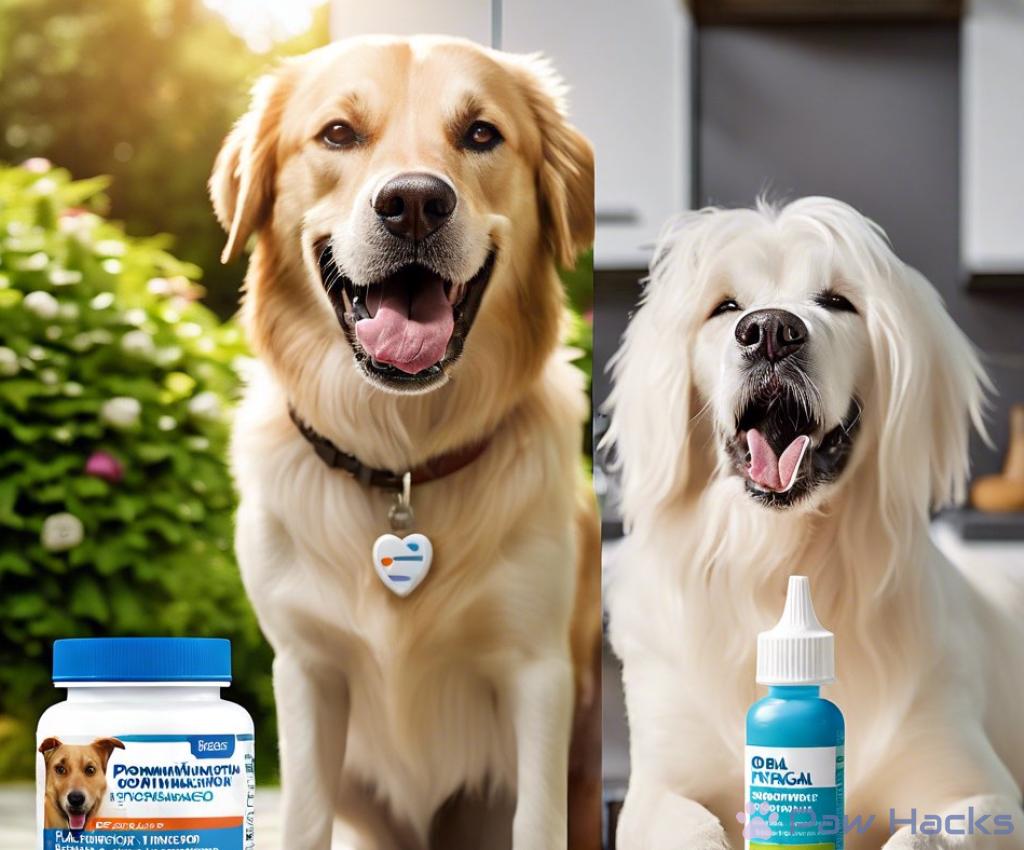Best Heartworm Preventatives for Dogs
Top Heartworm Preventatives: What You Need to Know
Heartworm disease is a serious and potentially fatal condition that affects dogs, caused by parasitic worms that live in the heart and blood vessels. Understanding the importance of prevention is crucial for every dog owner. The good news is that there are several effective preventatives available that can keep your furry friend safe.
When it comes to heartworm preventatives, there are a variety of options available, each with its own unique benefits. Knowing the differences can help you make an informed choice for your dog’s health.
- Oral Tablets: These are taken monthly and are effective in preventing heartworm larvae from developing into adult worms.
- Topical Treatments: Applied directly to the skin, these preventatives are also administered monthly and can repel other parasites.
- Injections: Administered by a veterinarian, these long-lasting treatments can protect your dog for up to six months.
Choosing the right heartworm preventative for your dog can feel overwhelming, but it doesn’t have to be. Factors such as your dog’s age, weight, lifestyle, and any existing health conditions should all be considered. Consulting with your veterinarian is essential to find the best option tailored to your pet’s needs.
| Preventative Type | Frequency | Notes |
|---|---|---|
| Oral Tablets | Monthly | Easy to administer, effective against multiple parasites. |
| Topical Treatments | Monthly | Repels fleas and ticks, suitable for dogs that dislike pills. |
| Injections | Every 6 months | Convenient for busy owners, requires vet visit. |
Comparing Oral vs. Topical Heartworm Medications: Which is Best for Your Dog?

Understanding the Options
When it comes to safeguarding your beloved canine companion against heartworm disease, the choice between oral and topical medications can be a pivotal decision. Both options have their unique merits, and understanding these differences can empower you to make the best choice for your dog’s health. It’s essential to weigh factors such as convenience, efficacy, and your dog’s specific needs when considering these preventatives.
Evaluating Oral Medications
Oral heartworm preventatives, typically available in the form of flavored tablets, offer a straightforward approach to protection. These medications are usually administered once a month, ensuring that your dog receives consistent protection against heartworm larvae. One of the significant advantages of oral tablets is their ease of use; many dogs readily accept the flavor, making it a hassle-free option for pet owners. Moreover, many of these tablets also provide coverage against other parasites like fleas and ticks, giving you a comprehensive solution for your pet’s health.However, it is crucial to administer them regularly and on schedule to maintain their effectiveness. Missing a dose can leave your dog vulnerable to infection.
Exploring Topical Treatments
On the other hand, topical heartworm preventatives offer a different type of convenience. Applied directly to the skin, these solutions are also typically administered on a monthly basis. One of the standout features of topical treatments is their ability to repel not just heartworm larvae but also other common parasites such as fleas and ticks. For dogs that are particularly resistant to taking pills, topical options may be an ideal solution.Additionally, they can be a great choice for busy pet owners who may find it easier to apply a topical treatment rather than remember to give a pill every month. However, it’s important to ensure that the application area is dry and free from any other topical products to maximize effectiveness.
Ultimately, the best choice between oral and topical heartworm medications may depend on your dog’s individual preferences and lifestyle. Some dogs thrive on regimen and may respond well to oral tablets, while others may prefer the simplicity of a topical solution. In any case, consulting with your veterinarian is crucial to determine the most effective and suitable option for your furry friend, ensuring they remain safe from the threat of heartworms.
Natural Alternatives to Heartworm Prevention: Are They Effective?
As pet owners become more aware of the potential side effects of traditional heartworm preventatives, many are actively seeking natural alternatives. These options often include herbal remedies, dietary changes, and lifestyle adjustments that claim to offer protection against heartworm disease. However, the effectiveness of these natural solutions remains a topic of debate among veterinarians and pet owners alike.
Natural remedies such as garlic, diatomaceous earth, and certain essential oils are often touted as viable options for heartworm prevention. While some believe that garlic can help repel mosquitoes— the primary carriers of heartworm larvae—it’s essential to note that garlic can be toxic in high amounts. In fact, there is no scientific evidence to conclusively support the claim that these alternatives can effectively prevent heartworm disease. Instead, they may provide minimal protection at best, leaving dogs vulnerable to infection.
Understanding the Risks of Natural Remedies
Many pet owners may be drawn to natural alternatives due to the perception that they are safer than traditional medications. However, this assumption can be misleading. Just because something is natural does not mean it is harmless. The potency and safety of herbal treatments can vary widely, and without proper guidance, a dog could be at risk for adverse reactions. Additionally, the lack of regulation in the supplement industry means that the quality of natural products can be inconsistent, further complicating their reliability as heartworm preventatives.
Consultation is Key
Before making any changes to your dog’s heartworm prevention plan, it is crucial to consult with a veterinarian. They can provide valuable insights into the effectiveness of natural alternatives and help you weigh the benefits against any potential risks. Your veterinarian can also guide you in finding a balanced approach that incorporates safe, proven methods alongside any natural options you may be considering. Remember, the health of your furry friend is paramount, and ensuring they are protected from heartworm disease should always be a top priority.
Understanding the Importance of Regular Heartworm Testing for Dogs
As responsible pet owners, ensuring the health and well-being of our dogs is paramount. While administering heartworm preventatives is a crucial step, it is equally vital to understand the role of regular heartworm testing in safeguarding your furry friend against this life-threatening disease. By combining preventive measures with routine screenings, you can effectively manage your dog’s risk and catch any potential issues early on.
The Critical Role of Testing in Prevention
Heartworm disease is caused by parasitic worms that can lead to severe health complications if left untreated. Even with a consistent preventative regimen, no method is infallible. Regular testing is essential to confirm that your dog is free from heartworm infection. This is particularly important for dogs that might have missed doses of their preventatives or those that have been in contact with other infected animals. Routine testing allows for timely intervention in case of an infection, which significantly increases the chances of successful treatment.
Recommended Testing Frequency and Procedure
The American Heartworm Society recommends that all dogs be tested for heartworm disease at least once a year, regardless of their preventive medication status. This annual test typically involves a simple blood draw that can detect the presence of adult heartworms. If your dog is a puppy, the first test should be conducted at six months of age, as they are especially vulnerable to infection. Understanding the testing procedure can ease any apprehension you might have; the process is quick, and results are usually available within a few days.
In some cases, depending on your dog’s lifestyle and geographical location, your veterinarian may recommend more frequent testing. For instance, dogs that travel frequently or spend time in high-risk areas may benefit from semi-annual tests. It’s crucial to have an open dialogue with your vet regarding your dog’s specific needs to tailor a heartworm prevention plan that includes regular testing.
Empowering Yourself with Knowledge
Being informed about heartworm disease, its prevention, and the importance of regular testing can empower you as a pet owner. Understanding the potential risks and what steps to take can help you make the best decisions for your dog’s health. In addition to heartworm testing, maintaining a comprehensive approach that includes a balanced diet, regular veterinary check-ups, and a consistent exercise regime will further enhance your dog’s overall health. Remember, the earlier an infection is detected, the better the outcome, so prioritize regular testing as part of your dog’s health care routine.
How to Choose the Right Heartworm Preventative for Your Dog’s Lifestyle
Understanding Your Dog’s Unique Needs
Selecting a heartworm preventative that aligns with your dog’s lifestyle is essential for ensuring their long-term health and well-being. Each dog is unique, and factors such as age, activity level, and overall health can influence which preventative is the best fit. By considering these elements, you can make a more informed decision that protects your furry friend from heartworm disease.
Assessing Lifestyle and Activity Level
Your dog’s activity level plays a crucial role in determining the most suitable heartworm preventative. For example, active dogs that spend a lot of time outdoors may be more exposed to mosquitoes, the primary carriers of heartworm larvae. In such cases, a monthly oral tablet or a topical treatment that also repels other parasites may be the most effective choice. On the other hand, if your dog is more of a couch potato, a less frequent injectable option could suffice, providing the protection needed without the hassle of monthly doses.
Additionally, consider your dog’s age and any existing health conditions. Puppies, for instance, should start a heartworm prevention regimen as early as six months, while senior dogs may require special considerations due to potential health issues. Discussing your pet’s health with your veterinarian is vital to tailoring a prevention strategy that meets their specific needs.
Convenience and Compliance Factors
Another important aspect to keep in mind is convenience. If you’re a busy pet owner, monthly oral tablets may be more challenging to administer consistently. In this case, a topical treatment or an injectable option might be more practical, ensuring that your dog receives the necessary protection without added stress for you. Compliance is key, as missing a dose can leave your dog vulnerable to heartworm infection.
Ultimately, the goal is to find a heartworm preventative that fits seamlessly into your lifestyle while providing comprehensive protection for your dog. Regular conversations with your veterinarian can help you stay informed about the best options available and make adjustments as needed based on changes in your dog’s health or lifestyle.
Share this content:



